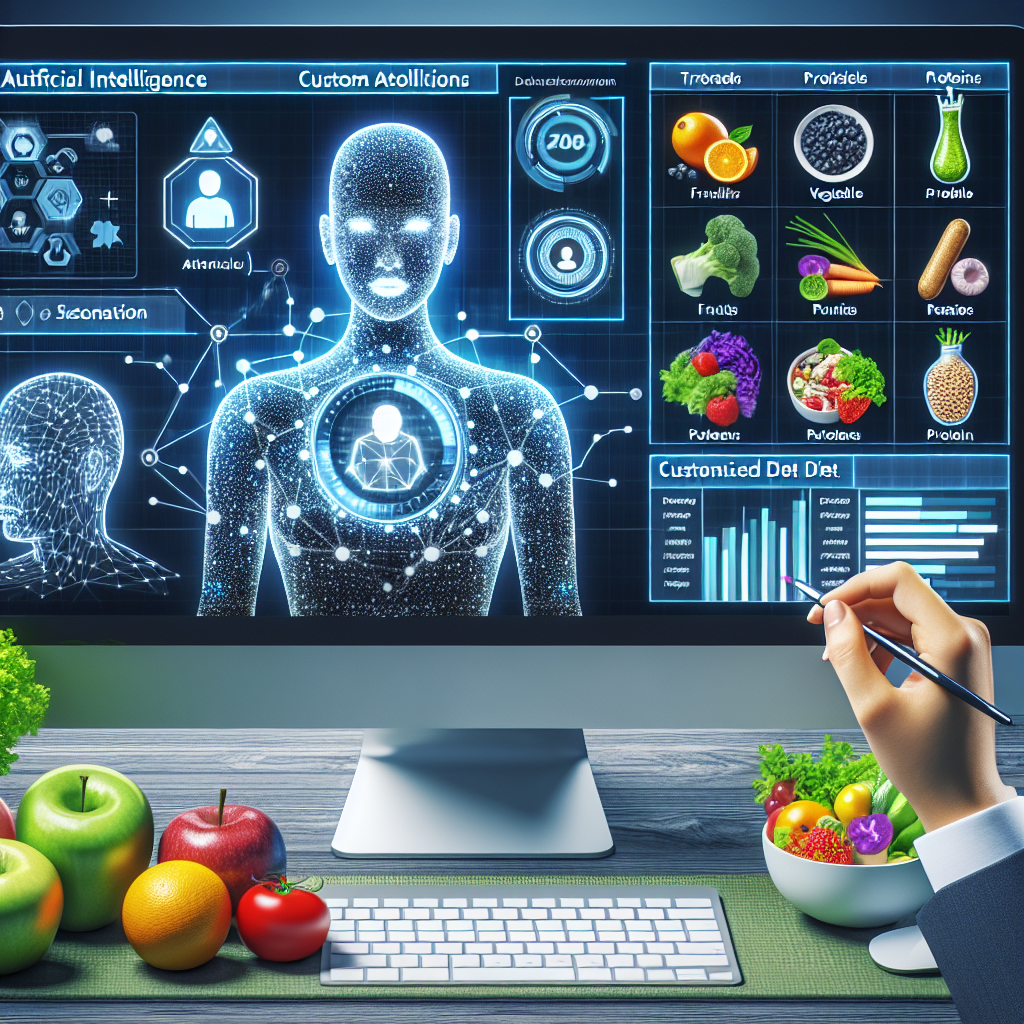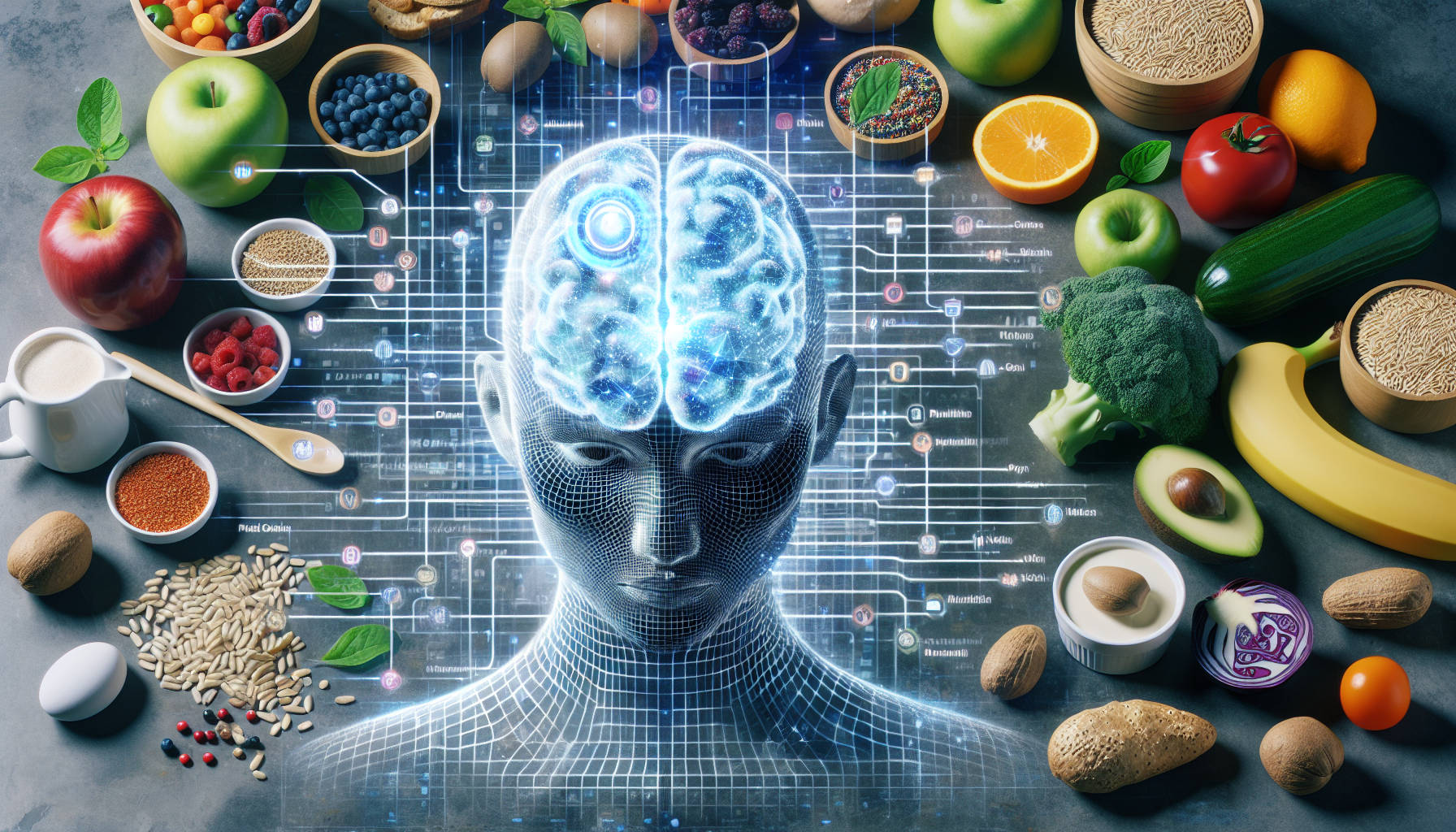AI and Custom Health Solutions: Tailoring Your Diet

Discover the future of personalized nutrition with AI and Custom Health Solutions. Tailor your diet to your unique needs and unlock your body’s full potential. Visit My Vibrant Vitality now to start your journey towards vibrant health!
Leveraging AI to Create Personalized Nutrition Plans
In the realm of health and wellness, the advent of artificial intelligence (AI) has ushered in a new era of personalized care, particularly in the domain of nutrition. The traditional one-size-fits-all approach to dieting is being rapidly replaced by bespoke nutrition plans, meticulously tailored to meet the unique physiological needs and health goals of each individual. This transformation is largely attributed to the integration of AI technologies in the development of custom health solutions, a trend that is redefining how we approach diet and nutrition.
AI-driven nutrition planning begins with the collection and analysis of vast amounts of data. This includes not just the individual’s dietary preferences and restrictions, but also more complex information such as genetic predispositions, metabolic rates, and current health conditions. By harnessing the power of machine learning algorithms, AI systems can sift through this data, identifying patterns and correlations that would be impossible for a human to discern. This level of analysis allows for the creation of highly personalized diet plans that are not only optimized for weight loss or maintenance but also for the prevention and management of chronic diseases.
Moreover, AI’s predictive capabilities are a game-changer in nutritional planning. For instance, by analyzing an individual’s eating habits and health outcomes over time, AI can forecast potential nutritional deficiencies or health issues before they become problematic. This proactive approach to health management empowers individuals to make informed decisions about their diet, potentially averting health crises before they occur.
Another significant advantage of AI in nutrition is its adaptability. As individuals progress on their health journeys, their nutritional needs invariably change. AI systems can continuously monitor these changes in real-time, adjusting diet plans as needed to accommodate new health goals, changes in lifestyle, or even alterations in an individual’s health status. This dynamic approach ensures that the nutritional advice remains relevant and effective, fostering sustained engagement and compliance.
Furthermore, the integration of AI in nutrition planning democratizes access to personalized health advice. Traditionally, the development of a customized diet plan would require multiple consultations with a nutritionist or dietitian, a luxury not accessible to everyone due to cost or geographical limitations. AI-driven solutions, on the other hand, can be made available through mobile apps or online platforms, offering personalized dietary recommendations at a fraction of the cost and making them accessible to a broader audience.
However, the implementation of AI in nutrition is not without its challenges. Privacy concerns and the ethical use of personal health data are paramount considerations. Ensuring the security of sensitive information and obtaining informed consent from users are critical components that must be addressed to build trust and encourage the adoption of these technologies.
In conclusion, the integration of AI into the development of custom health solutions represents a significant leap forward in the field of nutrition. By offering personalized, adaptable, and accessible diet plans, AI has the potential to revolutionize how we approach diet and health, moving us closer to a future where preventive healthcare and personalized nutrition are not just ideals but realities. As we continue to navigate this exciting frontier, the emphasis must remain on leveraging these technologies responsibly, ensuring that they serve to enhance, not compromise, our health and well-being.
The Role of Artificial Intelligence in Customizing Dietary Recommendations

In the realm of health and wellness, the adage “one size fits all” is rapidly becoming obsolete, especially when it comes to dietary recommendations. The intricate dance between nutrition and individual health is as complex as it is personal, necessitating a more tailored approach to diet planning. Enter the transformative power of Artificial Intelligence (AI), a technological marvel that is reshaping the landscape of personalized health solutions. This article delves into the pivotal role AI plays in customizing dietary recommendations, offering a glimpse into a future where your diet is as unique as your DNA.
The journey into personalized nutrition through AI begins with understanding the unique biological makeup of an individual. Traditional dietary guidelines have often been criticized for their broad-stroke approach, failing to account for the myriad of factors that influence one’s nutritional needs. Factors such as genetics, metabolism, lifestyle, and even gut microbiota can significantly impact how one’s body responds to different foods. AI, with its ability to analyze vast datasets, is perfectly poised to untangle this complex web of interactions, providing insights that were once beyond our grasp.
AI-driven platforms are now capable of sifting through genetic information, medical histories, and personal health goals to craft dietary plans that are not just tailored, but also adaptive. These platforms use sophisticated algorithms to predict how an individual might react to certain foods or supplements, allowing for a level of customization that is truly groundbreaking. Moreover, as these AI systems learn more about a person’s responses over time, they can adjust recommendations in real time, ensuring that the dietary plan evolves in tandem with the individual’s changing health needs and preferences.
The integration of AI into dietary planning also extends to the realm of disease prevention and management. For individuals with chronic conditions such as diabetes, heart disease, or food allergies, AI can be a game-changer. By analyzing patterns and outcomes, AI can help identify the optimal dietary strategies that can either mitigate the risk of developing such conditions or manage their symptoms more effectively. This proactive approach not only has the potential to improve the quality of life for millions but also to reduce the overall burden on healthcare systems.
Furthermore, AI’s role in customizing dietary recommendations is not limited to individual health optimization. It also has far-reaching implications for public health. By aggregating and analyzing data from diverse populations, AI can help identify nutritional trends and deficiencies on a larger scale, informing public health policies and interventions. This could lead to more nuanced and effective nutritional guidelines that better reflect the needs of different demographic groups.
In conclusion, the fusion of AI and custom health solutions represents a significant leap forward in our quest for optimal nutrition and wellness. By tailoring dietary recommendations to the individual, AI not only enhances the efficacy of diet plans but also empowers individuals to take control of their health in a way that was previously unimaginable. As we continue to unlock the potential of AI in this domain, the promise of truly personalized nutrition moves closer to reality, heralding a new era of health and wellness tailored to each person’s unique needs.
How AI-Driven Platforms Are Revolutionizing Individual Health and Diet Management
In the realm of health and nutrition, the one-size-fits-all approach is rapidly becoming a relic of the past. The dawn of artificial intelligence (AI) in the health sector has ushered in an era of personalized diet and nutrition plans, revolutionizing the way individuals manage their health and dietary needs. AI-driven platforms are at the forefront of this transformation, offering custom health solutions that are tailored to the unique genetic makeup, lifestyle, and health goals of each individual. This article delves into how these innovative platforms are reshaping the landscape of diet management and personal health.
Traditionally, dietary recommendations were based on general guidelines that aimed to cater to the average person. However, the inherent flaw in this approach is the assumption that what works for one individual will work for another. This is where AI steps in to bridge the gap. By leveraging vast amounts of data and employing sophisticated algorithms, AI-driven platforms can analyze a person’s genetic predispositions, dietary preferences, and even their response to certain foods. This level of analysis allows for the creation of highly personalized diet plans that can optimize an individual’s health outcomes.
Moreover, the integration of AI in health and diet management goes beyond mere personalization. These platforms are equipped with the capability to continuously learn and adapt to the changing needs and responses of an individual. For instance, if a person’s health goals shift from weight loss to muscle gain, the AI system can adjust their diet plan accordingly, ensuring that it remains aligned with their current objectives. This dynamic adaptability ensures that the dietary recommendations remain relevant and effective over time.
Another significant advantage of AI-driven diet management is its ability to predict and prevent potential health issues before they arise. By analyzing patterns in a person’s eating habits and health metrics, AI can identify risk factors for diseases such as diabetes or heart conditions. Armed with this information, the platform can recommend dietary adjustments that can mitigate these risks, offering a proactive approach to health management.
Furthermore, these AI platforms also democratize access to personalized nutrition advice, which was once the preserve of elite athletes and the wealthy. Through mobile apps and online services, individuals can now access custom health solutions at their fingertips, making it easier than ever to manage their diet and health. This accessibility is a game-changer, empowering people to take control of their health in a way that was not possible before.
In conclusion, the integration of AI into diet and health management is a testament to the potential of technology to enhance our lives in profound ways. By offering personalized, adaptable, and proactive dietary recommendations, AI-driven platforms are setting a new standard in individual health management. As these technologies continue to evolve, we can expect even more innovative solutions that will further tailor our diet and health regimes to our individual needs. The future of health and nutrition is personalized, and AI is leading the charge towards this exciting horizon.